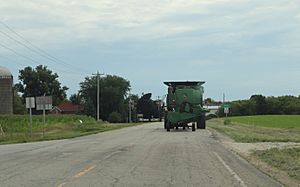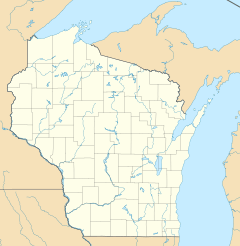Rosiere, Wisconsin facts for kids
Quick facts for kids
Rosiere, Wisconsin
|
|
|---|---|

Rosiere Sign in 2020
|
|
| Country | |
| State | |
| Counties | Kewaunee, Door |
| Towns | Lincoln, Brussels |
| Elevation | 814 ft (248 m) |
| Time zone | UTC-6 (Central (CST)) |
| • Summer (DST) | UTC-5 (CDT) |
| Area code(s) | 920 |
| GNIS feature ID | 1572620 |
Rosiere (/roʊˈzɛər/ ROH-zair) is a small place in Wisconsin, United States. It is called an "unincorporated community." This means it is not officially a city or town with its own local government. Rosiere sits right on the edge of two counties: Kewaunee County and Door County. It is also part of two "towns" called Lincoln and Brussels.
Contents
Rosiere's Past: A Quick Look
Rosiere likely got its name from settlers who came from a place called Petit-Rosière in Belgium. The first post office in Rosiere opened in 1871. Charles Rubens (1827–1903) was the very first person to be in charge of the post office there.
Wind Power: The Rosiere Wind Farm
In 1999, Rosiere became home to the Rosiere Wind Farm. This is a special area where wind power is used to make electricity. The farm covers about 30.5 acres (about 12 hectares) of land near the community.
How the Wind Farm Was Built
When it was finished, the Rosiere Wind Farm was the biggest wind farm in the eastern United States. It was built on land that was rented from local landowners. The way the wind turbines were set up was planned to make their sound as quiet as possible.
What People Said About the Turbines
Even with careful planning, some neighbors had concerns. In 2004, two neighbors filed a lawsuit because they felt the turbines were causing problems. Other people complained about shadows from the blades, poor TV reception, and more traffic in the area. There were also worries about cows getting sick. Some thought this might be due to something called stray voltage, which is a small amount of electricity that can be found in unexpected places.
Impact on Property and Wildlife
The wind turbines have not caused home values to go down in the area. However, studies from 1998 to 2001 showed that each turbine might cause the death of about 1.29 birds and 4.26 bats each year.
Massart Farmstead: A Historic Move
In 1984, some old buildings from the Massart Farmstead were moved from Rosiere. These buildings were taken to Heritage Hill State Historical Park in Allouez, which is near Green Bay, Wisconsin. A total of seven buildings from the farm were carefully moved to the park to be preserved.
Images for kids
 | Lonnie Johnson |
 | Granville Woods |
 | Lewis Howard Latimer |
 | James West |




